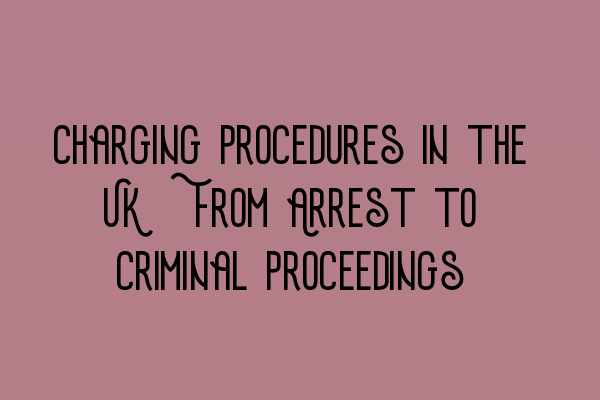Charging Procedures in the UK: From Arrest to Criminal Proceedings
Welcome to SQE Criminal Law & Practice UK, your trusted source for all things related to criminal law. In this blog post, we will walk you through the charging procedures in the UK, providing you with a comprehensive understanding of the process from arrest to criminal proceedings.
The Arrest
Every criminal case begins with an arrest. When a person is suspected of committing a crime, they may be arrested by the police. In some cases, the arrest may occur without a warrant if the police have reasonable grounds to believe that an offense has been committed. To learn more about the arrest process, check out our article on SQE 1 Practice Exam Questions.
Police Investigation
Following the arrest, the police will conduct an investigation to gather evidence related to the alleged crime. This may involve interviewing witnesses, collecting forensic evidence, and analyzing any available CCTV footage. It is crucial for the police to follow proper procedures during the investigation to ensure that the evidence gathered is admissible in court. To prepare for the police investigation stage, take a look at our SQE 1 Practice Mocks FLK1 FLK2 article.
Charging Decision
Once the police have completed their investigation, they will make a charging decision. This involves deciding whether there is enough evidence to proceed with criminal charges against the suspect. The decision is made by the Crown Prosecution Service (CPS) and is based on the Code for Crown Prosecutors. To get a detailed understanding of the charging decision process, enroll in our SQE 2 Preparation Courses.
Court Proceedings
If the charging decision is positive, the case will proceed to court proceedings. The suspect will be formally charged, and the case will be brought before a magistrate’s court or a higher court, depending on the seriousness of the offense. During the court proceedings, evidence will be presented, witnesses will be called, and the defendant will have an opportunity to defend themselves. To learn more about court proceedings, explore our SQE 1 Preparation Courses.
SRA SQE Exam Dates
For aspiring lawyers, it is essential to stay updated with the SRA SQE exam dates. These exams test your knowledge and understanding of various legal topics, including criminal law and practice. To ensure you are well-prepared for the exams, keep an eye on the upcoming exam dates by visiting our dedicated article on SRA SQE Exam Dates.
Thank you for visiting SQE Criminal Law & Practice UK. We hope this comprehensive guide to charging procedures in the UK has provided you with valuable insights. If you have any further questions or would like to explore more legal topics, feel free to browse through our website or contact our team. Stay tuned for more informative articles!
